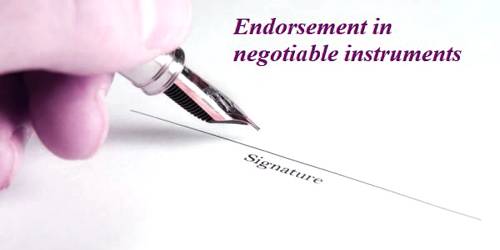Endorsement in negotiable instruments
The endorsement has different meanings, but in the law of negotiable instruments such as checks and securities, it is the act of the owner or payee signing his/her name to the back of a check, bill of exchange or other negotiable instruments so as to make it payable to another or cashable by any person. It is also sometimes referred to as “endorsement”. An endorsement may be made in favor of another individual or legal entity, resulting in a transfer of the property to that other individual o legal entity.
An accommodation endorsement is a guarantee given by one person (or legal entity) to induce a bank or other lender to grant a loan to a different person (or legal entity). It is also the banking practice whereby one bank endorses the acceptances of another bank, for a fee, making them appropriate for purchase in the acceptance market. The endorsement of a check, bill of exchange, or note consists of words, qualifying nor not, followed by the signature of the endorser, who may be the payee, drawee, accommodation endorser, or holder, or simply the signature alone thereof.
Different types of endorsement are –
- Blank or General Endorsements.
- Special or Full Endorsements,
- Restrictive Endorsements,
- Partial Endorsements,
- Conditional Endorsements.
















